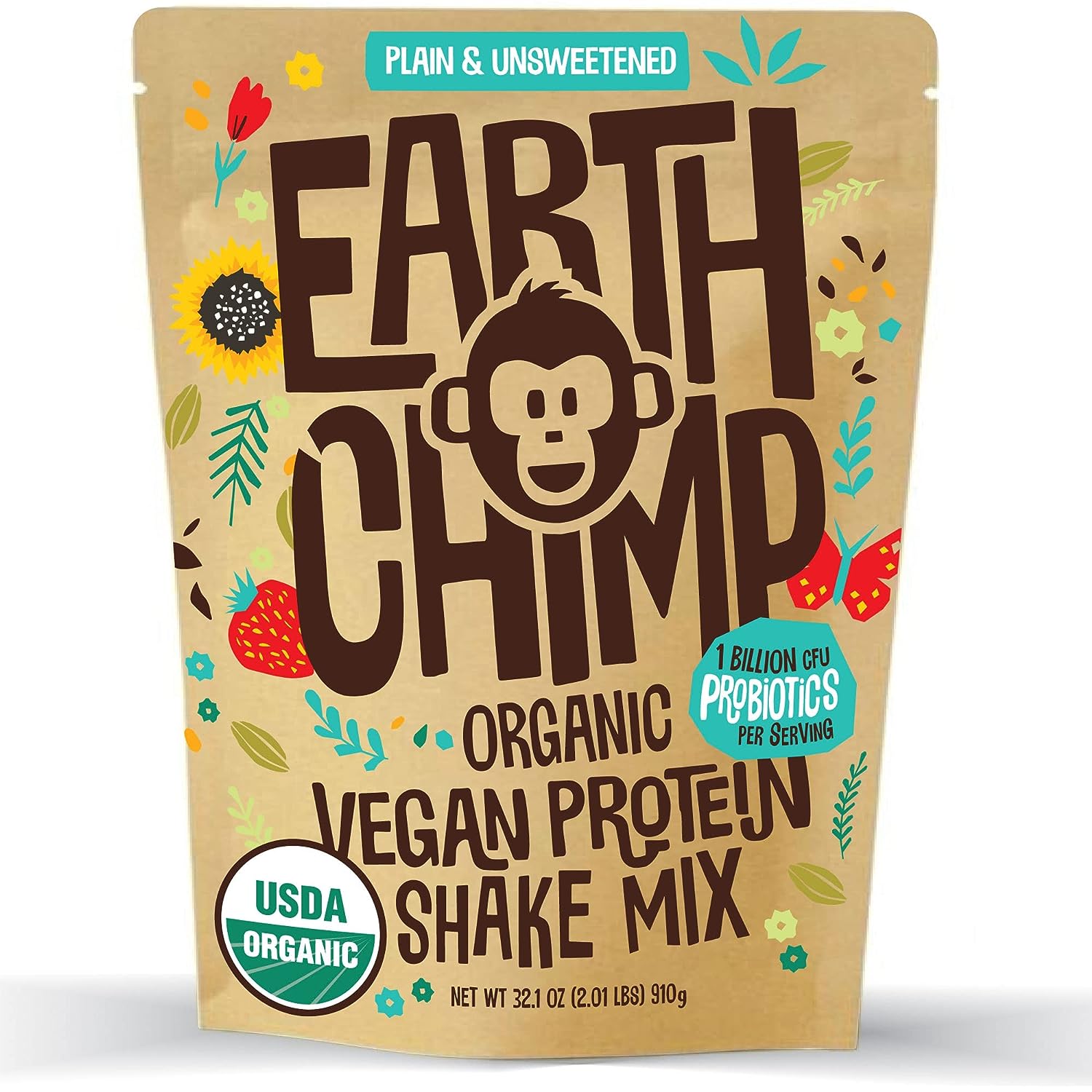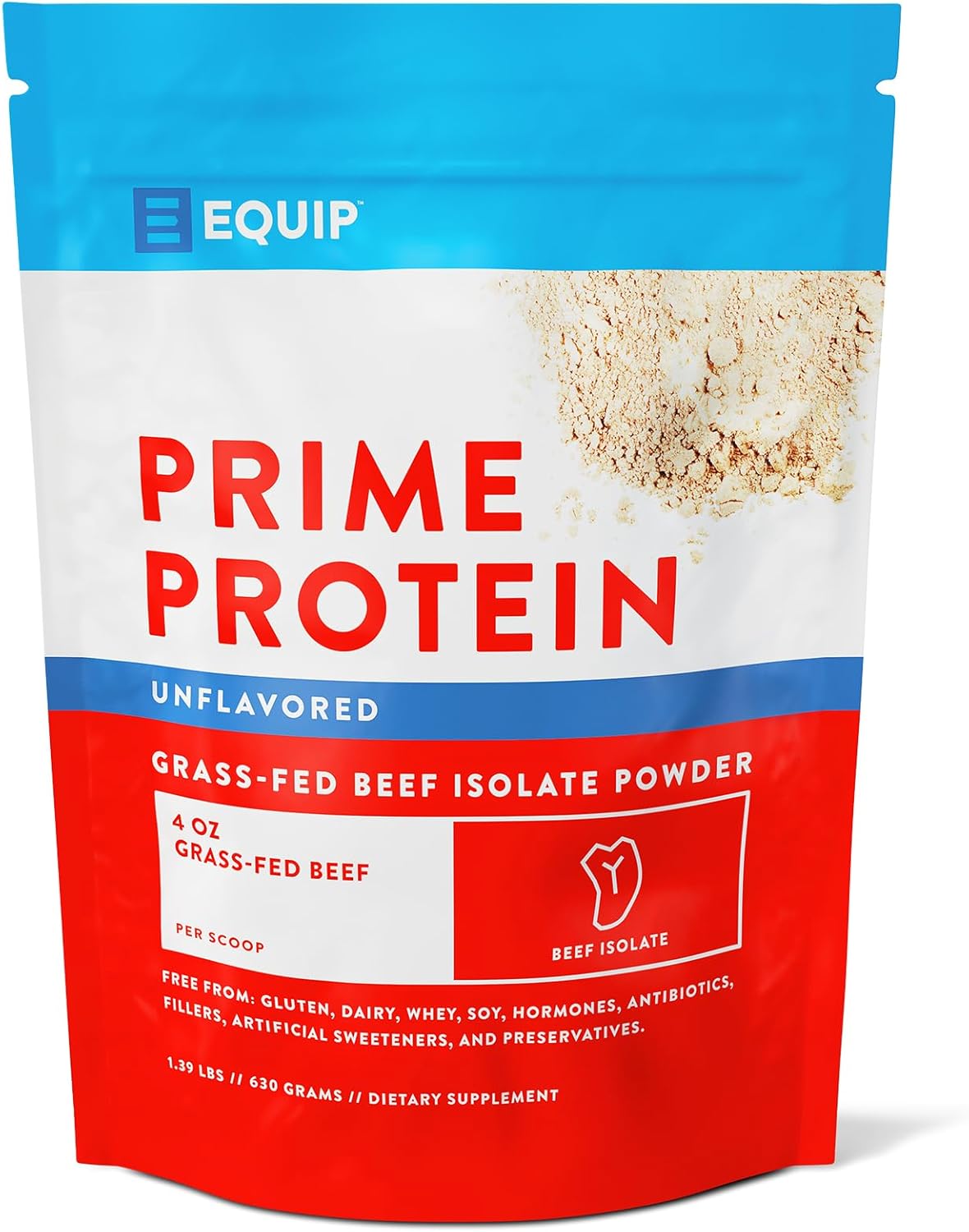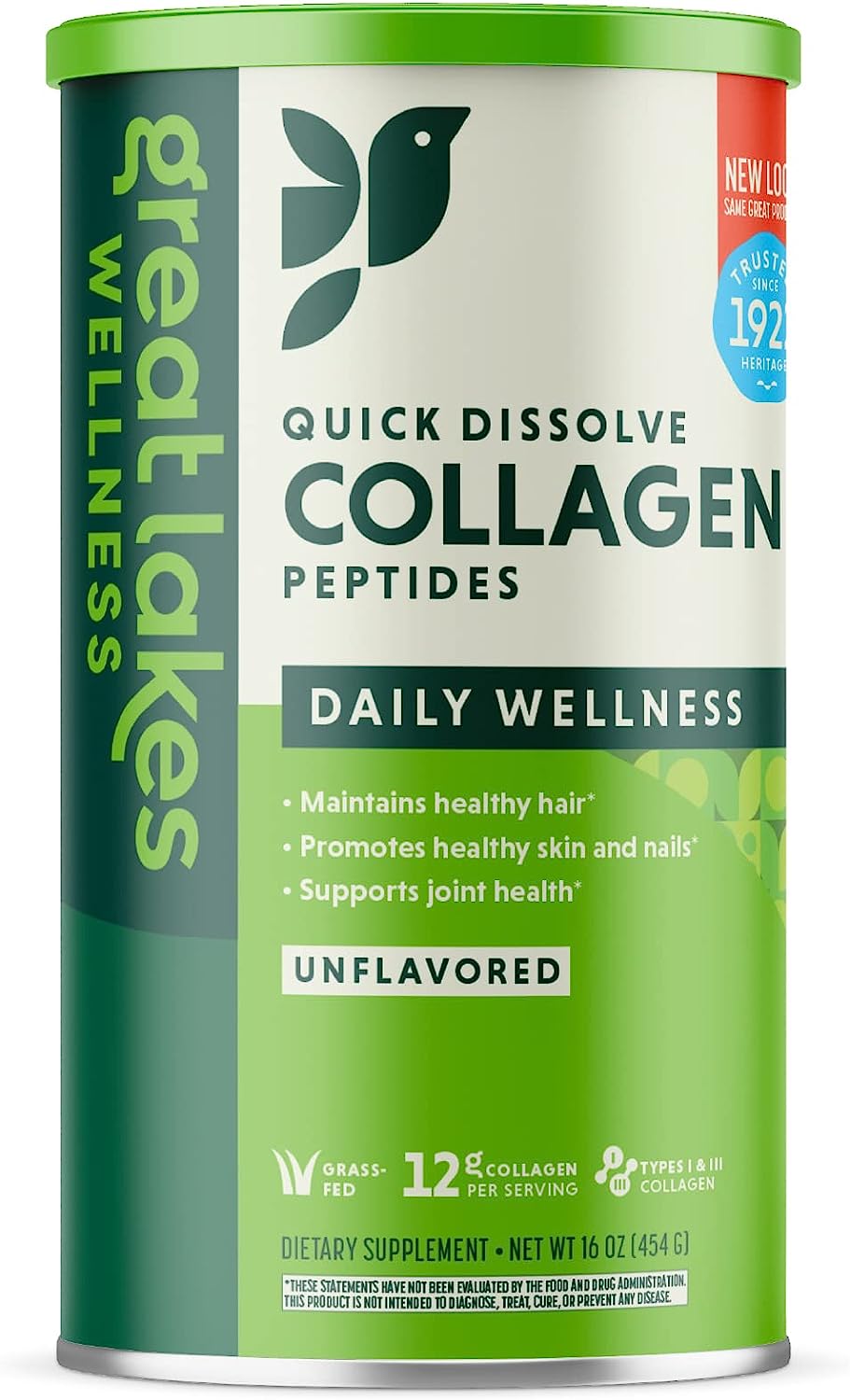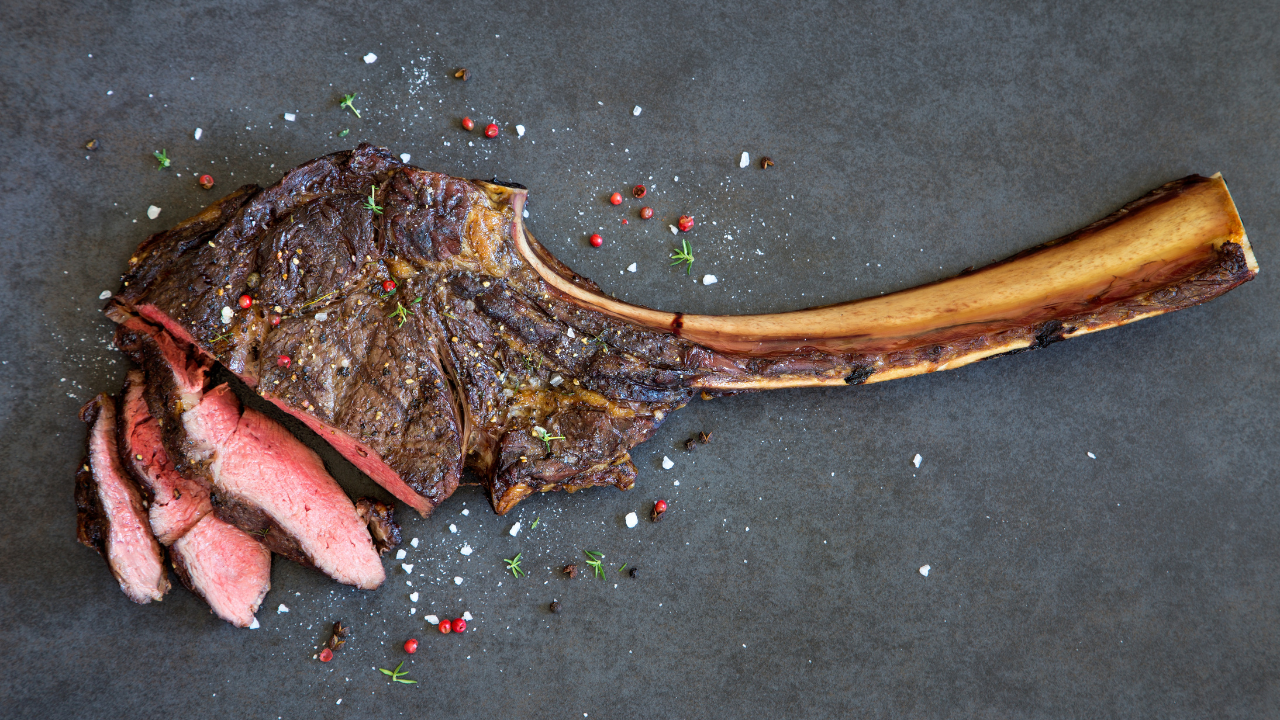Picking the Perfect Protein Powder: A Thyroid Thriver's Guide
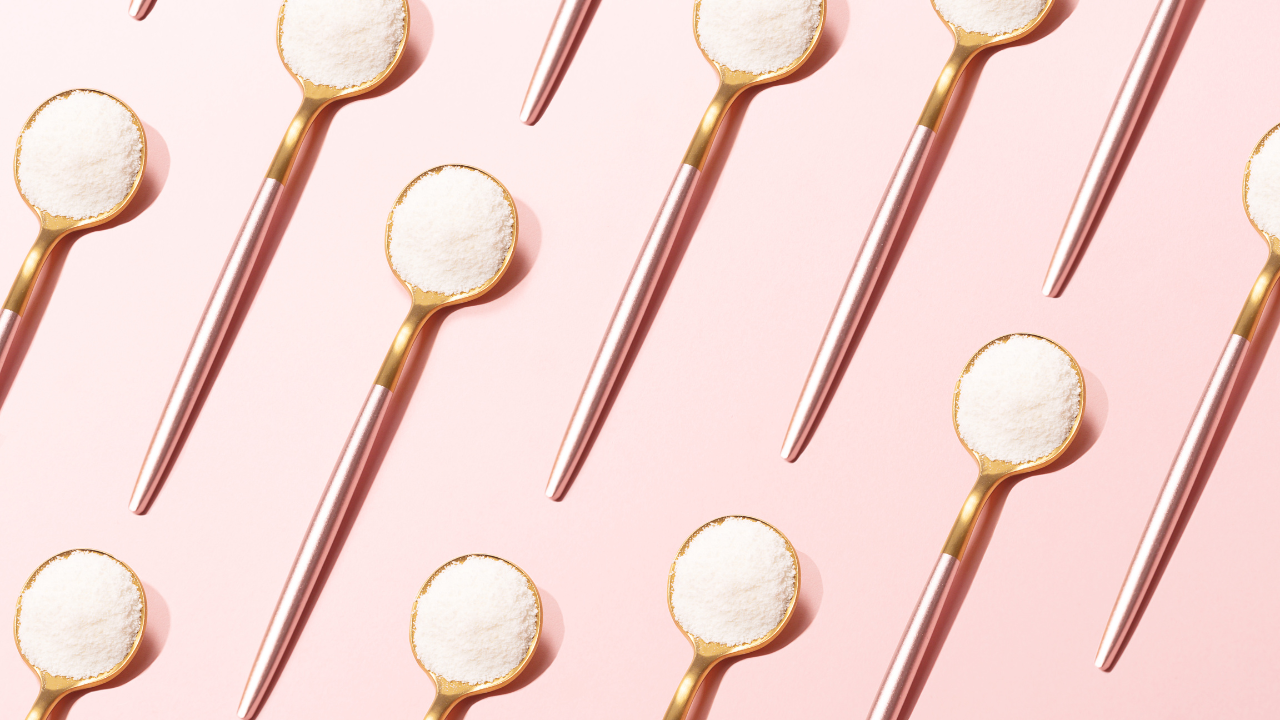
Finding the right protein powder can feel like searching for a needle in a haystack—especially when you have thyroid issues or dietary restrictions. From mystery ingredients to hidden sugars and even heavy metals, the protein powder aisle can be overwhelming. And yet, getting enough protein is essential for thyroid health, energy, blood sugar balance, muscle maintenance, and more.
For Thyroid Thrivers, a high-quality protein powder can be a powerful and convenient tool to add to your "Thrivers' Toolkit"—but only if you know what to look for.
In this blog post, I’ll walk you through everything you need to know about choosing a thyroid-friendly protein powder, including the most important ingredients to avoid, how to vet product labels, and what type of protein may work best for your needs. You’ll also find my favorite go-to brands—the ones I personally use and feel confident recommending after testing dozens over the course of a year.
Want to listen instead? I’ve also recorded an audio version of this post on the Thyroid-Healthy Bites Podcast.
Podcast Links:
- Listen on the podcast page
- Listen / Subscribe on iTunes
- Listen / Follow on Spotify
- Watch / Subscribe on YouTube
- Listen / Subscribe on Amazon Music
Watch the Video: Thyroid-Friendly Protein Powders + Live Taste Test
If you’d rather watch me break it all down—with a live taste test added in—don’t miss my YouTube video, where I share my top picks. It’s a great way to see one of my top protein powder options in action.
Let’s take the guesswork out of this together so you can confidently choose a protein powder that works for your thyroid and overall health—not against it.
Disclaimer: This information is for educational and inspirational purposes only. Always consult with your doctor or other qualified healthcare providers before making changes to your diet, health care, or exercise regimen. Affiliate disclosure: Some of the links in this post may be affiliate links. As an Amazon Associate, I earn from qualifying purchases. Purchasing a product using one of these links will support my work at no additional cost to you. Please know that any product recommendations I share here are my own.
Why Protein Matters for Thyroid Thrivers
Protein is an essential nutrient for anyone, especially for Thyroid Thrivers. To optimize all the functions of the body that the thyroid affects (which pretty much means all functions of the body), high-quality protein is a requirement.
Consuming adequate protein helps us:
- Build and maintain lean muscle mass
- Promote blood sugar balance
- Maintain skin, hair, nails, and gut health
- Consume amino acids that are supportive to our gut and thyroid function, such as glycine, tyrosine, glutamine, and proline
- Support weight loss
- Support metabolism
- Support fat burning
- Support healthy immune function
- Stay satisfied between meals
- Consume key thyroid-supporting nutrients like zinc, iron, and selenium
Hypothyroidism, Hashimoto's, or life without a thyroid can make everything on the list above more challenging than it is for the average bear. Let's zero in on that first item on the list: building and maintaining lean muscle mass.
According to Dr. Emily Kiberd, founder of Thyroid Strong and one of the contributors to my Thyroid-Friendly Workout Kit, if you have an underactive thyroid, it's harder to maintain muscle mass. Hypothyroid myopathy or muscle weakness affects about 79% of people with hypothyroidism. Strength training combined with adequate protein consumption helps us build muscle, and muscle is often referred to as the "Organ of longevity."
Maintaining our muscle mass is one of the best things we can do for our health and our thyroid function. Muscles are a major target for thyroid receptors to receive the signaling of thyroid hormones. When the thyroid is underactive, type 2 muscle fibers will atrophy, making it harder to maintain muscle mass. To have good thyroid hormone turnover, Kiberd says, we need to stimulate the muscles.
While it's not great news that we face these challenges as Thyroid Thrivers, being aware of them is what empowers us to make the best choices for our health. Protein can be like a secret weapon on your journey to optimal well-being.
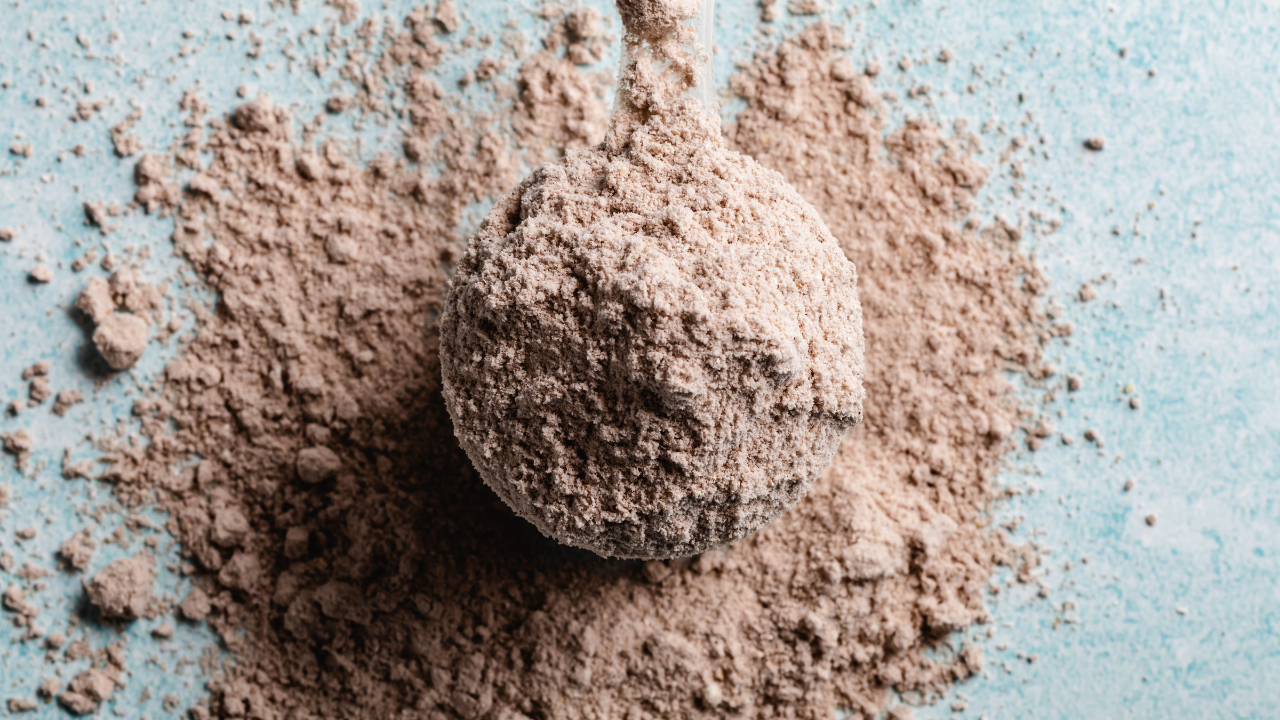
How Much Protein is Enough?
The question of how much protein we need daily sparks lively debates among experts. While recommendations vary, the two most common approaches I hear from thyroid and fitness experts are the grams per meal approach and the grams per pound approach. Allow me to explain.
The grams-per-meal approach is a simple rule of thumb: Shoot for at least 30 grams of protein with every meal. As Dr. Emily Kiberd explains, "The recommended amount of protein per meal to stimulate muscle protein synthesis is a minimum of 30 grams per meal."
The grams-per-pound approach recommends between 0.5 to 1 gram of protein per pound of your ideal body weight. Health and nutrition expert J.J. Virgin tells her readers: "While your protein needs will differ, depending on things like age and activity level, you’ll want to aim for around .75 to 1 gram of protein per pound of your body weight. Let’s say your ideal body weight is 150 pounds. That means you’ll want to get 113–150 grams of protein per day, ideally divided into three meals."
As you can see, opinions vary on this topic, but these guidelines give you an idea of what neighborhood you want to be in with your protein consumption. How much you need depends on your current circumstances, like how active you are or what your goals are. Are you doing a lot of strength training and actively trying to build muscle? Are you over age 40 and tipping into the phase of life where you're more prone to muscle loss? Do you have an underactive or missing thyroid due to hypothyroidism, Hashimoto's, or treatments for Graves Disease or thyroid cancer? If any of these apply, you may need to up your protein intake.
If you're already getting enough protein, more is not necessarily better. Like other calories, excess calories from protein may be stored as fat in the body. Regularly overdoing it on protein also comes with some health risks, like taxing the kidneys or elevating the fats in your blood like triglycerides or cholesterol (since animal protein often comes with saturated fat).
Getting adequate protein, as in getting enough for your personal needs and physical makeup, is the name of the game. In my coaching practice, working mostly with women who have hypothyroidism or Hashimoto's, and who tend to be very weight and calorie conscious, I feel like it's far more common that we're not getting enough protein. And if you're not getting enough protein, you'll have a harder time maintaining optimal health, strength, balanced blood sugar, energy, and vitality.
Pick a protein goal that works for and makes sense to you and your unique needs. Here's my personal approach, just to give you an example...
My Personal Approach to Getting Enough Protein
As a woman with Hashimoto's, in my mid-forties, approaching menopause, and actively trying to build and maintain muscle, I shoot for about 30 grams of protein per meal at a minimum. This usually puts me between 90 and 120 grams of protein per day. Because I don't do well with lots of dairy, most of my protein comes from meat, fish, and poultry, plus some plant-based sources.
Depending on the source, between 3 and 6 ounces of animal protein usually does the trick in hitting that 30-gram mark, so you don't need to be eating the Fred Flintstone steak at every meal to get enough.
Using a portion of animal protein that is the size of your palm as a guideline is commonly recommended, but for someone like me with smaller hands, I often go a skosh bigger than that to get that 30 grams. My trusty kitchen scale has come in handy here in terms of learning what 30 grams of protein looks like with different foods.
Getting enough protein is tough, and in working with clients, I find that most of us aren't. Even as a nutritionally literate health coach and chef, getting in that much protein daily can be a challenge, especially when life gets hectic. I have to plan for it, cook for it, be mindful of it, and put regular effort into it, especially when it comes to getting at least 30 grams, 3x/day.
That's the magic of protein powder. A quick scoop or two, along with some nutrient-dense plant foods, and a whirl in the blender, and you've got a convenient shake or smoothie that's perfect for those busy days or as a post-workout recovery drink. It's also a great way to stay satisfied between meals and reduce cravings if maintaining a healthy weight is a goal of yours.

How to Pick the Perfect Protein Powder
After countless community requests for protein powder recommendations, I decided it was time to dive into the endless sea of choices to try and find the perfect one. What I thought would take a few weeks stretched into months as I sampled, researched, and started compiling notes. In the end, this comprehensive guide was over a year in the making, and there's still so much to learn and new types of protein powder coming to market every day. What I came away with, in addition to a few favorites, was a grasp on how to vet protein powders, so in this section, I'll share that process and criteria with you, so that you can use it to pic your perfect protein powder.
Picking the perfect protein powder can be a minefield for a Thyroid Thiver, especially when you're avoiding ingredients like dairy, soy, grains, or eggs - which are common ingredients in protein powders. Add to that the hurdle of uber-long ingredient lists, added sugar or sugar substitutes, supplements, stimulants, and artificial ingredients, and finding the right product takes some seriously fancy footwork.
My beef with protein powders (pun intended) is that most of them are full of junk, and made with questionable ingredients that could be harboring scary things like heavy metals, stimulants, or even crazy amounts of iodine, which can be disastrous for thyroid patients.
So, where to begin? When you're trying to pick a perfect protein powder, start by thinking about what you do and don't want in it. Craft a list of criteria based on your personal preferences as well as your dietnary needs, and health goals.
Here's my basic criteria of what to look for in a thyroid-friendly protein powder:
- A complete protein source
- Free from gluten, dairy, added sugar, and soy
- Free from any other ingredients YOU are sensitive to
- Ideally, free from erythritol
- A short ingredient list with real food ingredients
- Available in an unsweetened/unflavored option
- Free of trans fats or partially hydrogenated oils
- Safe and pure ingredients, ideally third-party tested
You may have different or additional needs to add to this list. Are you looking for plant-based options? Does your protein powder need to adhere to a specific therapeutic protocol, such as Paleo or the Autoimmune Protocol (AIP)? Are you looking for a flavored or unflavored product? Sweetened or unsweetened? We all have our unique needs and tastes to adhere to.
Personally, I don't use flavored protein powders because I like to prepare smoothies using different flavors and a wide variety of colorful fruits and vegetables, depending on the day. Color and flavor are important to me as a food lover and a nutritionally-minded thyroid patient, and I want to choose the colors, flavors, and nutrients that go into each smoothie I blend. If I buy a chocolate-flavored protein powder, for example, that's going to dictate the color and flavor of every smoothie I add it to. If I want a chocolate protein shake, I'd rather add my own cacao powder.
For similar reasons, I avoid sweetened protein powders, even those that use natural sweeteners or sugar alternatives like stevia. I find the added sweetness is often overpowering, and I would rather enjoy the pure taste (and natural sweetness) of whole-food ingredients like wild blueberries, bananas, or tropical fruits. While we want to avoid making sugar-bomb smoothies with loads of fruit and fruit juice, adding some fruit to your protein shakes can be a great way to add fiber and phytonutrients to your diet. I don't subscribe to the fear of fruit philosophy, because these foods are so nutrient-dense, and the vast majority of us aren't eating enough servings of fruits and vegetables each day. You may feel differently, or have different nutritional needs and circumstances.
There's a lot of personal preference that comes into play. Some coaching clients I've worked with really want that "just add ice and water" convenience that flavored protein powders can offer. To me, that's a missed nutritional opportunity to get more dietary diversity and colorful plant foods in, but you do you.
With so many unique tastes, food sensitivities, and dietary restrictions among us as thyroid patients, the question lingers: Is there a perfect protein powder? The real question is, "What's the perfect protein powder for YOU?"
One strategy you can use to fast-track your search is to narrow down the options first. Go back to that list of criteria above and make your own version that covers your unique preferences, needs, and dietary sensitivities. Think about what type of protein powders you are open to trying and which types you aren't. That's likely to cut out about 80% of the products on the market.
Let's take a quick look at some of the primary choices and options for protein powders to help you fine-tune your personal list of criteria and refine your search.
ON THE MENU: Chocolate Protein Smoothie
The Protein Powder Lineup
Diving into the array of protein powder options reveals a multitude of sources, each with its own unique advantages and considerations. Amongst the thousands of choices out there, protein powders are commonly made using these ingredients: whey (a dairy byproduct), egg, soy, rice, hemp, pea, beef, or collagen protein. Some products are made with a mixture of these. Some include other sources of protein, like watermelon seeds, pumpkin seeds, or sunflower seeds. The varieties are endless!
Some protein powder ingredients are okay for hypothyroidism or Hashimoto’s, and some are likely to cause inflammation, GI distress, or worse. As with all things, there is an element of bio-individuality, meaning that the protein powder that is right for one Thyroid Thriver may not be right for another. We each have unique needs and sensitivities and there is no one-size-fits-all.
This topic is big enough to fill a book, but let’s boil it down to which options are best and which to avoid for Thyroid Thrivers. Amongst thyroid experts who create their own protein powders (like Dr. Izabella Wentz and Amy Myers MD), they typically use these ingredients: beef protein, collagen protein, or pea protein. Let's compare...
3 MOST Recommended Types of Protein Powder for Thyroid Thrivers:
-
Beef Protein: Often called "beef protein isolate," this is a complete source of bio-available protein that comes with the added benefit of thyroid-supportive nutrients like tyrosine, selenium, iron, and zinc, as well as some naturally occurring collagen. Beef-based protein is often better tolerated than plant-based protein powders by those with compromised gut health. Depending on the product, it can also be Paleo and AIP-friendly, whereas most plant-based products are not. Make sure that what you’re buying is beef protein and not just bone broth or collagen protein to ensure you’re getting a complete protein (see item 2 below). Also, look for grass-fed beef protein to ensure you’re consuming a product that is more anti-inflammatory vs. inflammatory.
PROS: Concentrated source of protein, highly digestible for most.
CONS: Cost, flavor, may have to order online, may add lots of froth to smoothies.
-
Collagen or "Bone Broth" Protein: Collagen is terrific, but this one comes with a caveat: Collagen is not a complete protein. Incomplete protein does not mean that it's 'bad' protein or that it isn't protein at all. It's still protein! Your body can still get lots of goodness out of incomplete proteins, but pay close attention when buying beef-based proteins to determine if what you are getting is indeed a complete beef protein because there can be confusing labeling with some products. Complete proteins include all nine essential amino acids. Collagen can add significant protein and other beneficial nutrients to your smoothie, which support skin, hair, nail, and gut health; however, collagen lacks tryptophan, one of the nine essential amino acids necessary for your body to utilize the protein as building blocks for muscle and other tissues. Collagen dissolves easily and is relatively flavorless. It can be a great addition to your smoothies, but it's not the ideal option for a standalone protein powder. Try combining collagen protein with other types of complete protein to get all nine essential amino acids and the most benefits.
PROS: Relatively flavorless and dissolves in anything, easy to source.
CONS: Not a complete protein. Can be costly.
-
Pea Protein: Pea protein is a complete, plant-based, vegan protein source with a relatively mild taste. Peas are a legume, so this option is not Paleo or AIP-compliant. While some of us are sensitive to legumes and have a hard time digesting them, pea protein can be a less inflammatory and more digestible option than whey or egg-based proteins. Always look for organic pea-based protein powders to avoid GMOs and thyroid-disrupting agricultural chemicals. Also, high levels of heavy metals have been detected in some plant-based protein powders, so look for products that offer transparency and third-party testing for safety and purity.
PROS: Plant-based, easy to source, complete protein, relatively inexpensive.
CONS: Legumes are difficult for some to digest, may cause gas, and may add a chalky texture.
While many products contain a blend of proteins from various ingredients, and there are numerous other types not listed here (like watermelon seed protein, for example), these top 3 seem to be the most commonly recommended by thyroid experts. Next, let's take a look at some other types of protein that are common but come with caveats and cautions.
2 LESS Recommended Types of Protein Powder for Thyroid Thrivers:
- Hemp Protein: Hemp is a borderline-complete protein, meaning that it contains all nine essential amino acids but not enough of some of them to be considered complete. Hemp is high in fiber and Omega-3 and Omega-6 fats. One big downside is that hemp imparts a strong, earthy taste that overpowers other smoothie ingredients. A scoop of hemp protein may work in some smoothies, but I don't feel that this option makes an ideal choice for everyday use.
PROS: Plant-based, relatively affordable, healthy fats, fiber
CONS: Strong overpowering flavor, borderline-complete protein
2. Rice Protein: While rice protein can be easier to digest than whey or egg protein, it is not considered a complete protein and must be combined with other proteins to be considered complete. Additionally, because of the way rice is grown in water, it can be high in heavy metals, especially arsenic, so using rice protein daily may not be an ideal or thyroid-friendly choice.
PROS: Plant-based, relatively inexpensive, easy to source
CONS: Incomplete protein, may be high in arsenic and other heavy metals
We each have to make our own choices about which protein powder is right for us, but it's important to be aware of some of the issues present in certain options. Some protein sources should be approached with caution.
Let's wrap it up by looking at some of the least suitable options for Thyroid Thrivers.
3 LEAST Recommended Types of Protein Powder for Thyroid Thrivers:
-
Whey Protein: While whey is considered anti-inflammatory for those who tolerate dairy, it’s considered inflammatory for those who are sensitive to dairy; and for Thyroid Thrivers, that means most of us, as dairy is the second most common dietary trigger for us. Whey is a dairy byproduct and, therefore, contains dairy proteins like casein and lactose. These proteins can be hard to digest, leading to bloating, gas, diarrhea, constipation, joint pain, leaky gut, and other inflammatory symptoms.
-
Egg Protein: Like dairy, eggs can be a good source of protein for some and troublesome for others. This depends on whether or not we’re sensitive to eggs, which many of us are to varying degrees. The lysozyme in eggs, which is a protective enzyme, can be inflammatory in some people with autoimmune disease or thyroid issues. Those potentially problematic proteins or enzymes are highly concentrated in an egg-based protein supplement, making egg protein a somewhat risky option.
-
Soy Protein: Soy has some positive nutritional qualities but typically isn’t recommended for those with thyroid issues. Functional thyroid experts like Dr. Izabella Wentz, recommend avoiding soy because it is an endocrine disruptor, xenoestrogen, and particularly disruptive to thyroid function. Soy is considered a "goitrogen" or thyroid-suppressing ingredient, and whereas other goitrogenic foods can be cooked or fermented to reduce their thyroid-inhibiting compounds, this does not apply to soy. Now, there is a caveat here, that some functional/holistic thyroid experts disagree, like Dr. Alan Christianson, who debunked most of the research against soy for thyroid patients when I interviewed him on Thyroid-Healthy Bites. Personally, I'm keeping my ear to the ground on this one and continuing to use moderation with this controversial ingredient, especially when considering drinking it regularly in a concentrated form like protein powder.
Looking at these differences between types of protein, it becomes clear that our specific needs as thyroid patients differ in some ways from those of the general population. Are these "riskier" types of protein inherently bad? Not necessarily.
All three of these options come with their unique health pros and cons, but when so many of us are intolerant to dairy, when so many of us are more prone to food sensitivities like eggs, and when so many of us are sensitive to thyroid-disrupting foods like soy, these options come with more potential to contribute to inflammation and other symptoms. If you're drinking a protein shake or smoothie on a daily basis - especially one that includes these ingredients in concentrated forms - that risk is multiplied. So, the question to ask yourself is: Why not choose a type of protein that is less likely to trigger inflammation and other issues?

Other Ingredients to Watch Out For in Protein Powder
As with any packaged food, it’s essential to carefully read protein powder labels. Typically, the fewer ingredients, the better. Many protein powders are packed with added fillers and supplemental ingredients that can be problematic, including added sugars, unhealthy fats, caffeine and other stimulants, or high amounts of iodine from ingredients like kelp powder.
Also, pay attention to the quality of the ingredients. Are they whole food-based? Is the beef grass-fed? Is it third-party tested for purity? Is the company transparent about the quality and safety of their products? Sleuthing out these answers is worth your while to ensure that you are getting a quality product that won’t contribute to inflammation, autoimmunity, toxic burden, or disease.
Some protein powders have been found to contain high levels of heavy metals. Heavy metals aren't added to the protein powders but rather absorbed by the plants or animals from their environment. Because of our reliance on fossil fuels and coal, heavy metals are increasingly prominent in our air, water, and soil. This seems to be a more prominent issue with plant-based protein powders, but heavy metals can be present in animal-based products, too.
While this has become a contentious topic among scientific analysts and protein powder manufacturers, it illuminates potential hidden dangers that are important for us as thyroid patients. Heavy metals are particularly harmful to the thyroid, so it's a good idea to do diligent research before choosing a product you might consume regularly.
Read the reviews, search the internet for "[the name of your protein powder] + heavy metals" to see what comes up, reach out to the company directly, or look for products that are third-party tested for purity. Due to very high levels of industrial pollution and, therefore, heavy metal contamination, some experts recommend avoiding protein powders from China.
Also, keep in mind that protein powders are considered supplements, which the FDA does not regulate, so doing some extra sleuthing and careful sourcing is always a good idea here.
Speaking of supplements, use caution with protein powders that contain a long list of added herbs, mushrooms, vitamins, minerals, antioxidants, or "whole food blends." When a protein powder contains a laundry list of additives, even so-called "healthy" ones, it becomes impossible to isolate food sensitivities. If you react to something in that protein powder with 30+ ingredients, how the heck do you know which ingredient you're reacting to? You don't.
As Thyroid Thrivers, we are a sensitive bunch, so a long list of ingredients is a very common reason that protein powders (and other supplements) end up in the garbage can. I've personally been there too many times to count and wasted a lot of money on products that didn't work out for me for this reason. When it comes to ingredient lists, shorter is almost always better.
Additionally, when you look at those super-long ingredient lists with a magnifying glass, you may find that they're packed with sneaky energy boosters like caffeine. You could be getting a massive energy boost, thinking it's from your protein powder when it's actually from added stimulants like coffee extract or green tea extract.
Another thing we thyroid patients need to be aware of are protein powders that contain biotin. Biotin can be great for supporting hair, skin, and nail health. The problem isn't that biotin is bad. The problem is that biotin can skew your thyroid test results. According to the American Thyroid Association, "Biotin use can result in falsely high levels of T4 and T3 and falsely low levels of TSH, leading to either a wrong diagnosis of hyperthyroidism or that the thyroid hormone dose is too high." The ATA recommends avoiding biotin for at least two days prior to thyroid testing to avoid skewed results.
Supplements are a big money industry, and with a lack of FDA regulation, it really is buyer beware. Skepticism, research, discernment, and a critical eye are required skills for Thyroid Thrivers shopping for supplements of any kind, including protein powders.
My Protein Powder Picks
Okay, let's get into it! I've tried a lot of protein powders and had to kiss many frogs before I found my protein powder prince(s). Only a few made the cut. Sadly, many of the protein powders I sampled ended up in the trash can. Some products I found unpalatable due to super-high amounts of natural sweeteners like stevia (a personal pet peeve of mine). Some caused excessive GI upset, like gas, bloating, or constipation. Some products tainted every smoothie I added them to with overpowering flavors, colors, or textures.
The good news is that these hard pass protein powders helped me narrow my search. I realized I was looking for not just a thyroid-friendly, gut-friendly, anti-inflammatory protein powder but a plain, unflavored, and unsweetened one as well.
Note: There are countless protein powders I haven't tried, and I've heard from many of you who are very passionate about your chosen ones. So, I may update these recommendations as I am able to sample and find more options I feel good about sharing with you. For now, these are the products I like most.
My favorite plant-based protein powder:
Earth Chimp Plain & Unsweetened
This recommendation came to me via my DMs from a fellow Thyroid Thriver. I liked the pure and relatively simple ingredient list of this organic, plant-based product from Ireland. Each item was recognizable and made sense. I also liked that it contained some of my favorite anti-inflammatory ingredients like anti-inflammatory turmeric, and blood-sugar-balancing cinnamon. I decided to give it a shot, and I'm so glad I did!
This hand-crafted blend of pea, pumpkin, coconut, and sunflower protein provides 21 grams of protein and 5 grams of fiber per two-scoop serving (35 grams). It's also about half the price of animal-based products. It was created in Dublin, Ireland by an athlete/doctor husband/wife team who were tired of searching for the quality they wanted from a plant-based protein shake.
Like other plant-based protein powders, it can be challenging for some to digest. The fiber is high, which can take a bit for your gut to get used to. If gas and bloating are an issue for you with plant-based protein, try starting with less than the recommended amount and gradually working your way up to a whole serving. The addition of digestive enzymes and probiotics helps ease this protein through the digestive tract.
PROS: Relatively affordable, clean and simple ingredients, complete protein
CONS: Mildly chalky, may cause gas/bloating, esp. at first, lower protein content per serving vs. beef-based proteins, and fewer servings per bag. Some may not want the supplemental ingredients like probiotics and digestive enzymes.
Favorite animal-based protein powder (#1 of 2):
Be Well by Kelly LeVeque, Unflavored Grass-Fed Protein Powder
To be honest, I had never heard of Kelly LeVeque before I started my hunt for the perfect protein powder, but it turns out she's got a loyal fan base as a celebrity nutritionist and wellness expert. This product contains just one simple ingredient: beef protein isolate.
While many other beef-based protein powders are dodgy about whether or not their products are a complete protein (some are collagen-only), what led me to Kelly is that she clearly states that her product is a complete protein, boasting 23 grams of bioavailable protein per scoop.
The other highlight of Be Well is purity. It's made without chemical processing, with beef from Swedish cows. My first question upon reading the "Swedish Cow" detail was, why does that matter?
As it turns out, Sweden boasts some of the most stringent cattle-raising policies in the world. Under Swedish law, cows have a "bill of rights," including grazing rights, and the use of drugs or hormones to grow the cows faster is banned. European food policies also restrict the use of GMOs.
Some reviewers complained about this product sticking to the sides of their blender, which happens because this protein powder contains no added anti-caking agents. Another complaint was that it caused excessive "frothing," which is due to the natural collagens it contains.
I experienced this when I first started using this product, so I understand what testers are talking about. I also found that it's an easy problem to fix.
Plopping this protein powder into the bottom of your blender as a first ingredient will result in much of it getting stuck to the bottom of the blender. Also, yes, it can create an excessively frothy texture if blended at high speeds for too long. To prevent this, simply blend all of your smoothie ingredients except the protein powder until they're smooth and ready to drink. Then, with your blender on low speed, add the protein powder last, pouring it into the center of the well. Mix at low to medium speed, just until incorporated. Adding this protein powder at the end and avoiding high-speed blending will prevent clumping, sticking, and excessive frothing.
PROS: Complete protein, high protein content, mild taste, easy to digest, grass-fed beef, Paleo, and AIP compliant, good transparency and third-party tested for safety.
CONS: Expensive, can stick to sides of blender if not added correctly, adds frothiness to blended drinks that some may find unappealing.
Favorite animal-based protein powder (#2 of 2):
Equip Prime Protein, Unflavored Grass-Fed Beef Protein Powder
This newest addition to my list came on the recommendation of my friend, fellow thyroid advocate, and thyroid fitness expert, Angela Brown. After hearing her rave about it, I decided to give it a try—and I’m so glad I did! This product checks all my boxes for a thyroid-friendly, gut-friendly, and clean protein powder.
Like Be Well, Equip Prime Protein is made with just one ingredient: grass-fed beef protein isolate. That’s it. No gums, no additives, no artificial flavors, and no sneaky sweeteners. Each scoop delivers 20 grams of complete protein, including all nine essential amino acids. It's also gluten-free, dairy-free, soy-free, Paleo, and AIP-friendly—making it a good option for those with autoimmune thyroid conditions or food sensitivities.
Compared to Be Well, which is a nearly identical product, Equip doesn't seem to froth up as much at high speeds. The other difference is the amount of protein per scoop - 20 grams in Equip vs. 23 grams in Be Well, but this is simply due to the size of the scoop (~20 vs 24 grams), so the amount of protein they contain is basically equal. They're also very close in price. There's a bit less information about the cows with Equip, other than that they use grass-fed beef, unlike the specified Swedish grass-fed beef that is used in Be Well.
Overall, this is a solid, clean, and thyroid-friendly protein powder option that I’ll be adding to my rotation.
PROS: Single ingredient, complete protein, mild flavor, smooth texture, Paleo and AIP-friendly, free from common allergens and additives, good transparency and third-party tested for safety.
CONS: Slightly lower protein content per scoop than isolate options, may clump if not blended properly, on the pricier side.
BONUS Recommendations / Honorable Mentions:
I want to give a shout-out to Great Lakes Collagen Peptides as a source of protein and gut-healing amino acids. Collagen supports skin, hair, nails, and joint health, all of which are things we Thyroid Thrivers could use some extra help with. I love this product and have been using it in my smoothies and my morning matcha for years! But, as we already discussed, it's important to note that collagen protein is not a complete protein. To address this, I simply combine the collagen peptides with another complete protein source, such as the two powders listed above, or I get my complete protein from a side of something like this AIP Lamb Sausage.
Collagen protein is still protein. And I'll say it again: Incomplete protein does not equal BAD protein! It just lacks some of the nine essential amino acids our bodies require to use that protein for cell repair or the production of tissues like organs, bones, muscle, cartilage, and skin. Adding those essential amino acids to our smoothies and protein shakes in some other format can help us utilize more of the incomplete protein from the collagen peptides and ensure our bodies are getting what they need to thrive.
PROS: High in amino acids like glycine, which are particularly supportive to our intestinal health. Supports skin, hair, nails, and joint health. Easy to source, reasonably priced. Dissolves in any liquid, hot or cold, and is virtually tasteless and textureless.
CONS: Collagen is not a complete protein.

Vital Proteins Collagen Peptides
March 2025 Update: Recently, I have made the switch to Vital Proteins Collagen Peptides and wanted to give them a shout-out and add them to the list. I made the switch primarily due to price changes and accessibility at my local health food store. Both products (Great Lakes and Vital Proteins) are comparable and good options for grass-fed beef collagen.
In Conclusion
I hope my hunt for the perfect protein powder, the thyroid-friendly criteria I outlined, and my list of favorite products are helpful to you in your own search for the perfect thyroid-friendly protein powder. When my health coaching clients or Thrivers Club Members ask me for recommendations, these are the products I point them to, but we all have unique needs and preferences. I encourage you to use this guide as a starting point to craft your own criteria, so you can find the best protein powder for your needs.
Thanks for reading and for your commitment to making the best, most empowered, and informed choices for your health, and keep on thriving!
Always cheering you on,

P.S. Need more thyroid-friendly recipe inspiration? I’ve got you covered. My Thyroid-friendly Everyday eCookbook features over 50 quick and easy, thyroid-friendly recipes your whole family will love. To take a peek at what’s inside, CLICK HERE.
Sources:
- https://www.ncbi.nlm.nih.gov/books/NBK519513/
- https://www.sciencedirect.com/topics/neuroscience/thyroid-hormone-receptor
- https://www.ncbi.nlm.nih.gov/pmc/articles/PMC4037849/
- https://www.mayoclinichealthsystem.org/hometown-health/speaking-of-health/are-you-getting-too-much-protein
- https://www.ncbi.nlm.nih.gov/pmc/articles/PMC7509468/
- https://nakednutrition.com/blogs/protein/chinese-whey-protein
- https://joint-research-centre.ec.europa.eu/scientific-activities-z/gmos_en
- https://www.ncbi.nlm.nih.gov/pmc/articles/PMC8532971/
Subscribe to my free newsletter for fresh recipes & lifestyle tips, delivered weekly, and receive a free gift!
By submitting this form, you agree to receive ongoing updates from Hypothyroid Chef




